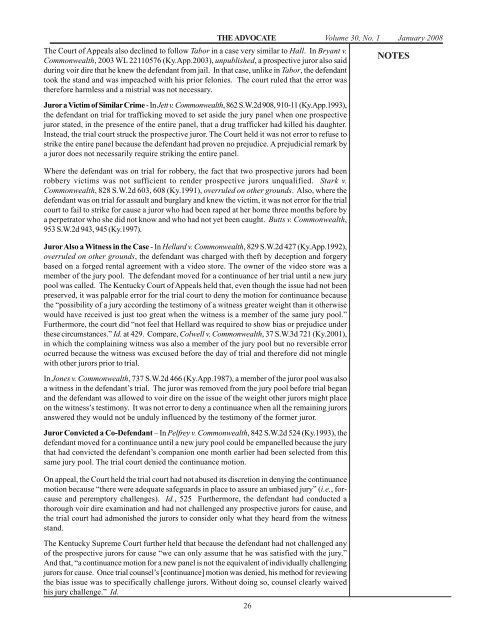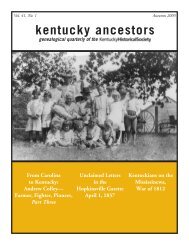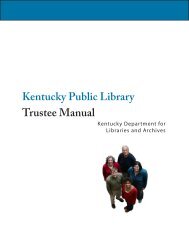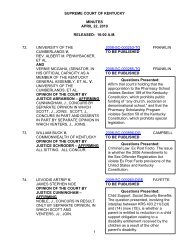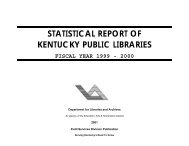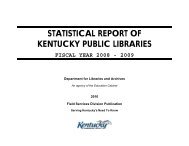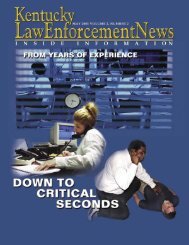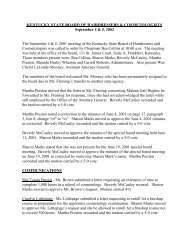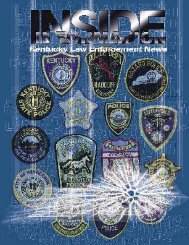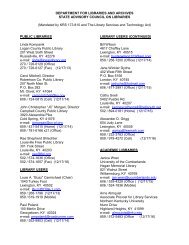Jan08 Advo.pmd - e-archives Home
Jan08 Advo.pmd - e-archives Home
Jan08 Advo.pmd - e-archives Home
You also want an ePaper? Increase the reach of your titles
YUMPU automatically turns print PDFs into web optimized ePapers that Google loves.
THE ADVOCATE Volume 30, No. 1 January 2008<br />
The Court of Appeals also declined to follow Tabor in a case very similar to Hall. In Bryant v.<br />
Commonwealth, 2003 WL 22110576 (Ky.App.2003), unpublished, a prospective juror also said<br />
during voir dire that he knew the defendant from jail. In that case, unlike in Tabor, the defendant<br />
took the stand and was impeached with his prior felonies. The court ruled that the error was<br />
therefore harmless and a mistrial was not necessary.<br />
Juror a Victim of Similar Crime - In Jett v. Commonwealth, 862 S.W.2d 908, 910-11 (Ky.App.1993),<br />
the defendant on trial for trafficking moved to set aside the jury panel when one prospective<br />
juror stated, in the presence of the entire panel, that a drug trafficker had killed his daughter.<br />
Instead, the trial court struck the prospective juror. The Court held it was not error to refuse to<br />
strike the entire panel because the defendant had proven no prejudice. A prejudicial remark by<br />
a juror does not necessarily require striking the entire panel.<br />
Where the defendant was on trial for robbery, the fact that two prospective jurors had been<br />
robbery victims was not sufficient to render prospective jurors unqualified. Stark v.<br />
Commonwealth, 828 S.W.2d 603, 608 (Ky.1991), overruled on other grounds. Also, where the<br />
defendant was on trial for assault and burglary and knew the victim, it was not error for the trial<br />
court to fail to strike for cause a juror who had been raped at her home three months before by<br />
a perpetrator who she did not know and who had not yet been caught. Butts v. Commonwealth,<br />
953 S.W.2d 943, 945 (Ky.1997).<br />
Juror Also a Witness in the Case - In Hellard v. Commonwealth, 829 S.W.2d 427 (Ky.App.1992),<br />
overruled on other grounds, the defendant was charged with theft by deception and forgery<br />
based on a forged rental agreement with a video store. The owner of the video store was a<br />
member of the jury pool. The defendant moved for a continuance of her trial until a new jury<br />
pool was called. The Kentucky Court of Appeals held that, even though the issue had not been<br />
preserved, it was palpable error for the trial court to deny the motion for continuance because<br />
the “possibility of a jury according the testimony of a witness greater weight than it otherwise<br />
would have received is just too great when the witness is a member of the same jury pool.”<br />
Furthermore, the court did “not feel that Hellard was required to show bias or prejudice under<br />
these circumstances.” Id. at 429. Compare, Colwell v, Commonwealth, 37 S.W.3d 721 (Ky.2001),<br />
in which the complaining witness was also a member of the jury pool but no reversible error<br />
ocurred because the witness was excused before the day of trial and therefore did not mingle<br />
with other jurors prior to trial.<br />
In Jones v. Commonwealth, 737 S.W.2d 466 (Ky.App.1987), a member of the juror pool was also<br />
a witness in the defendant’s trial. The juror was removed from the jury pool before trial began<br />
and the defendant was allowed to voir dire on the issue of the weight other jurors might place<br />
on the witness’s testimony. It was not error to deny a continuance when all the remaining jurors<br />
answered they would not be unduly influenced by the testimony of the former juror.<br />
Juror Convicted a Co-Defendant – In Pelfrey v. Commonwealth, 842 S.W.2d 524 (Ky.1993), the<br />
defendant moved for a continuance until a new jury pool could be empanelled because the jury<br />
that had convicted the defendant’s companion one month earlier had been selected from this<br />
same jury pool. The trial court denied the continuance motion.<br />
On appeal, the Court held the trial court had not abused its discretion in denying the continuance<br />
motion because “there were adequate safeguards in place to assure an unbiased jury” (i.e., forcause<br />
and peremptory challenges). Id., 525 Furthermore, the defendant had conducted a<br />
thorough voir dire examination and had not challenged any prospective jurors for cause, and<br />
the trial court had admonished the jurors to consider only what they heard from the witness<br />
stand.<br />
The Kentucky Supreme Court further held that because the defendant had not challenged any<br />
of the prospective jurors for cause “we can only assume that he was satisfied with the jury.”<br />
And that, “a continuance motion for a new panel is not the equivalent of individually challenging<br />
jurors for cause. Once trial counsel’s [continuance] motion was denied, his method for reviewing<br />
the bias issue was to specifically challenge jurors. Without doing so, counsel clearly waived<br />
his jury challenge.” Id.<br />
26<br />
NOTES


